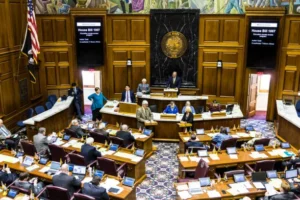President Donald Trump’s One Big Beautiful Bill could significantly change healthcare, especially with Medicaid work requirements in Alaska. The Congressional Budget Office (CBO) projects these changes could lead to 10.9 million more universal Americans by 2034.
The bill includes a mandate that certain Medicaid recipients work, volunteer, or train for at least 80 hours each month. CBO estimates that 18.5 million people annually would need to meet the requirement, and 5.2 million would lose coverage by 2034.
According to CBO, most losing Medicaid would not qualify for tax credits or employer coverage. Additionally, states would need to check eligibility every six months for some recipients at double the current rate.
This redetermination rule could push 700,000 more Americans off Medicaid rolls. These new conditions would strain the system in Alaska, where roughly 250,000 rely on Medicaid. Amber Lee, State Director for Project Our Care Alaska, warned the consequences would run deep.
In some rural areas, Medicaid supports more than 40% of residents. Seniors, veterans, and seasonal workers would likely feel the impact first. Lee added that Medicaid in Alaska fills critical gaps not covered by Medicare, including in-home care and basic needs like hearing aids and dentures.
Senator Dan Sullivan insisted no cuts were coming but acknowledged reforms targeting provider taxes. While Alaska doesn’t use providers’ taxes, CBO predicts that reform could cause 400,000 Americans to lose insurance as other states adapt.
Sullivan claimed Alaska would not feel the effects directly, but Lee disagreed. The proposed Medicaid work requirements in Alaska could reshape access and affordability, placing pressure on already stretched resources and vulnerable communities.










